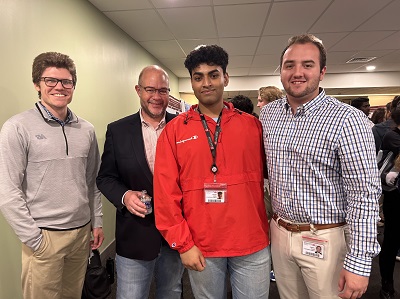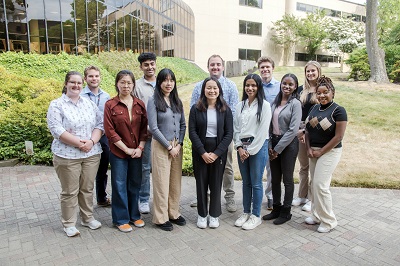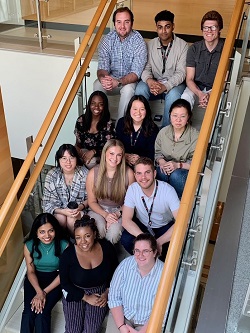Born to be a scientist
June 16, 2023
My name is Luke Fracek, I am a rising senior at the University of Delaware. My entire life, I have wanted to be a scientist. Even before I really knew what that would mean, I wanted to be the first person to discover something new. Through high school my interests had matured, and although all fields of science still fascinate me, I had narrowed my professional focus to biology. Since then, I have sought out every possible opportunity to gain experience in a laboratory setting. It was in these labs that I tried to gain memorable, hands-on experiences that would help me decide exactly what path I wanted to follow. Though the labs were good to write on a resume, I was not satisfied with the consistency and amount of time that I could dedicate to them. Luckily, there are summer programs. The Fox Chase UD fellowship seemed like the perfect opportunity to gain experience, learn about career paths, and develop professional skills all at the same time. It was such a great opportunity that I applied again after my first attempt was not successful.
During the first week of the fellowship, or “bootcamp,” we practiced basic techniques that are often employed in cancer research. Then I was sent off to work in a particular lab. In my first week in my assigned lab, I practiced more fundamental techniques and gained a better understanding of day to day “lab-activity”. I have also been presented with the general outline for my summer project, which I am very excited to begin working on. My mentor has recognized my level of prior understanding and adjusted accordingly. She has already given me the responsibility for maintaining cell lines for my own use. It is clear that the directors of the program want the fellows to genuinely enjoy their time during the program.
I have already gained a much better sense of what it actually entails to be a researcher, including the less glamorous, but immensely important aspects, such as how funding is acquired and the importance of understanding scientific literature. Now I am looking forward to working on my own project with some autonomy under the guidance of my mentor. Even outside of the “lab setting” it feels like I have grown a bit as a person by living mostly independently and taking care of myself and my apartment. I am never really “alone” though as the other fellows are all in similar situations and there is a great sense of camaraderie and mutual respect and support. Sometimes it feels like a fun summer camp, other times I feel like a genuine employee.
Getting down to business
July 16, 2023
 It is fun to work in a laboratory. My first few weeks working in the lab were everything that I reasonably hoped that they would be. I have learned more about cancer biology, experienced what it is like to attend a research seminar, prepared and gave my own short presentation, and gained day-to-day hands-on learning that I believe is essential to becoming a good researcher.
It is fun to work in a laboratory. My first few weeks working in the lab were everything that I reasonably hoped that they would be. I have learned more about cancer biology, experienced what it is like to attend a research seminar, prepared and gave my own short presentation, and gained day-to-day hands-on learning that I believe is essential to becoming a good researcher.
My project involves finding and investigating novel drug targets for epithelial ovarian cancer. More specifically, my role is to learn more about our protein of interest and how it may relate to another well-known pathway associated with cancer proliferation. Despite knowing nothing at all about this type of cancer initially, I have become wholly interested in participating in the research. So far, I have maintained 3 distinct cell lines, run western blots, and applied a drug treatment to those cell lines. I only had a little prior experience with cell culture before starting, but now I feel confident enough to maintain the cells mostly independently. The other techniques that I was initially unfamiliar with, I now feel fairly confident to perform them myself. My project has been planned out by my mentor and is both exciting and challenging. I am looking forward to learning new techniques and advancing my project. She has done a great job tailoring my work to my level of understanding when I entered the lab. I have some basic responsibilities that I take care of in my own time without supervision, I contribute to general lab chores, and then there are moments where my mentor watches me closely, only for my mentor to offer help to fix the issue I caused.
“Coming to the lab and making progress towards my goal for the summer is something that I look forward to."
For me, the major benefit of this program is constant immersion. I can dedicate enough time and focus to the things I am doing to really learn. Rather than performing a single procedure once in a lab class with 30 other students, not seeing any real results, and then quickly forgetting what the technique is actually about, I can really learn through repetition, time, and personal investment in the procedure. Coming to the lab and making progress towards my goal for the summer is something that I look forward to. It is incredibly refreshing to do something that I genuinely enjoy. I understand all the generic proverbs about finding a job that you actually enjoy doing. This immersion goes beyond the lab work too. I am not totally consumed by the work, rather I feel like I am an adult whose job is research. From managing time, meeting deadlines, cooking /cleaning for myself, etc. I’m learning as much about how to be independent as I am about how to be a researcher.
 The environment of the FCCC and the fellows is wonderful. Everyone has been absolutely supportive and understanding. The work has never been overwhelming or stressful, and a large part of that is due to the people. I feel just as much a part of the “team” at my lab as I do with the fellows despite there being almost no direct overlap.
The environment of the FCCC and the fellows is wonderful. Everyone has been absolutely supportive and understanding. The work has never been overwhelming or stressful, and a large part of that is due to the people. I feel just as much a part of the “team” at my lab as I do with the fellows despite there being almost no direct overlap.
Overall, my experience so far has been rewarding, and I am excited to continue participating in the program. I sincerely hope that I can live up to their expectations and I sincerely hope that I can live up to the expectations of this program and leave a good impression for any future student who may also be interested in applying.
Science works!
August 25, 2023
My experience as a member of the Empower Fellowship has been nothing short of phenomenal. My interest in research has been only fortified after spending 10 weeks working full-time in an actual lab setting. My PI, mentor, and all members of the staff who made this possible, are wonderful. I can only hope to do them some justice through this blog.
My project was to investigate the method by which a certain protein influenced the proliferation and viability of cells in spheroids. By learning about this, we could possibly develop drugs to target spheroids, a major contributing factor to the recurrence and local spreading of epithelial ovarian cancer. By blocking a major pathway that is involved in the proliferation of many cancers, we could see how cells that overexpress a protein of interest proliferate. If they proliferate and survive differently from the normal cells, then the protein signals outside of that pathway. Ultimately, we came to the conclusion that this protein is signaling both through this major MAPK pathway and outside of it as well, though it could stand to have more duplicates and a more in-depth investigation.
The end of the summer was much busier than any other portion. I knew what needed to get done, I understood the issues that had made achieving these goals difficult, and I knew the way to overcome them. It was simply a matter of getting to work and applying the skills I had learned. The last few weeks entailed lots of time management interspersed with a few moments that I felt giddy with joy at a good result or a successful recitation of my presentation.
“I wholeheartedly encourage any aspiring healthcare professionals or researchers to look into this program."
One of the most important takeaways from this time was hands-on experience with the idea that science works every time even if you don’t understand it. One of the last experiments we had time to perform showed the exact opposite results from what we expected. The cells that should have been proliferating and surviving more appeared to simultaneously proliferate, survive, and die more than the other cells. We knew that there was something off. After brainstorming the potential cause and repeating the experiment, we came to the conclusion that there may have simply been a labeling error along the way, causing the two cell types to behave in ways opposite from what we would expect otherwise. When checked under a fluorescent microscope, we saw confirmation  of this hypothesis. Our results were matching expectations, the experiment was performed successfully, but the tubes I used had been flipped somewhere along the line. Science works! If the data says something is different, the conditions must have been different too. This allowed me to turn impossible data that goes against the established understanding into supporting data for a new course of experimentation. I have a renewed appreciation for the value of the modern scientific method.
of this hypothesis. Our results were matching expectations, the experiment was performed successfully, but the tubes I used had been flipped somewhere along the line. Science works! If the data says something is different, the conditions must have been different too. This allowed me to turn impossible data that goes against the established understanding into supporting data for a new course of experimentation. I have a renewed appreciation for the value of the modern scientific method.
I have mixed feelings at the end of the program. I am very happy to say that my project culminated with an interesting and novel preliminary finding about the expression of our protein of interest. However, I am also disappointed that I will not be able to easily follow up on these findings and support the conclusions we came to with more data. If I could, I would absolutely love the opportunity to continue working with my mentor and PI in the future.
I wholeheartedly encourage any aspiring healthcare professionals or researchers to look into this program. I can’t imagine a more productive and enjoyable way to spend a summer as an undergraduate.